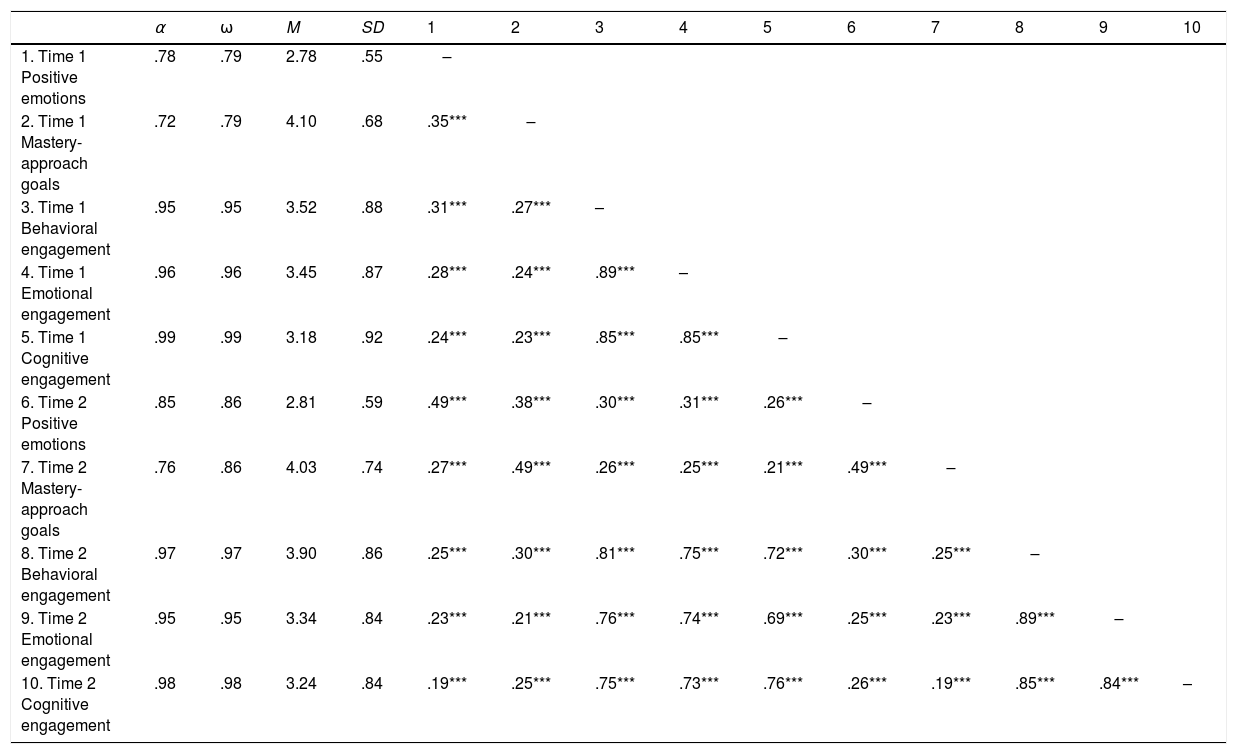Although prior research shows that well-being is linked to effective learning, there is scarce evidence on how positive emotions relate to achievement goals and objective measures of school engagement. Drawing from the broaden-and-build theory of positive emotions, this study examines the reciprocal associations of positive emotions with mastery-approach goals and teacher-reported academic engagement using a two-wave longitudinal design. A survey comprising measures to assess students’ positive emotions (i.e., Modified Differential Emotions Scale) and mastery-approach goals (i.e., Achievement Goal Questionnaire – Revised) was administered to 411 Filipino high school students at two separate time points (i.e., 1-month interval). Ten classroom advisers also filled in a teacher-reported measure of academic engagement to provide a more objective estimate of each student’s involvement in academic activities. Results of cross-lagged panel structural equation modeling via maximum likelihood estimation approach showed that positive emotions had positive concurrent relationships to mastery-approach goals and all engagement dimensions. Contradicting previous research, positive emotions did not predict subsequent mastery-approach goals and engagement after controlling for auto-regressor effects. Mastery approach goals positively predicted subsequent positive emotions, behavioral engagement, and cognitive engagement. Engagement dimensions did not relate to succeeding positive emotions and mastery approach goals. Results of this investigation highlight the emotional and academic benefits associated with students’ intrinsic drive to learn in school contexts.
Aunque investigaciones previas muestran que el bienestar personal está conectado con un aprendizaje efectivo, existe poca investigación sobre cómo las emociones positivas se relacionan con las metas de logro y las medidas objetivas de participación escolar. Sobre la base de la teoría de la expansión y construcción de emociones positivas, este estudio examina las asociaciones recíprocas entre las emociones positivas sobre metas de dominio y la participación académica estimada por el profesor (usando un diseño longitudinal de dos-ondas). Se ha administrado una encuesta que comprende medidas para evaluar las emociones positivas de los estudiantes (i.e., Modified Differential Emotions Scale; Fredickson et al., 2003) y sus metas de dominio (i.e., Achievement Goal Questionnaire - Revised) a 411 estudiantes de secundaria filipinos, en dos momentos distintos, con un intervalo de un mes. Diez orientadores escolares también han completado una medida de participación académica para proporcionar una estimación más objetiva de la intervención de cada estudiante en las actividades académicas. Los resultados de las ecuaciones estructurales de modelo de panel con retraso cruzado (“cross-panel structural equation modeling”), a través del enfoque de estimación de máxima probabilidad, muestran que las emociones positivas tienen relaciones simultáneas positivas con las metas de dominio y todas las dimensiones de compromiso académico. En contraste con investigaciones previas, las emociones positivas no predicen las metas de dominio subsiguientes y el compromiso académico, después de controlar los efectos del auto-regresor. Las metas de dominio predicen positivamente las emociones positivas subsiguientes, así como la implicación comportamental y cognitiva. Las dimensiones de compromiso no se relacionan con las emociones positivas sucesivas y las metas de dominio. Los resultados de esta investigación destacan los beneficios emocionales y académicos asociados con el impulso intrínseco de los estudiantes para aprender en contextos escolares.









